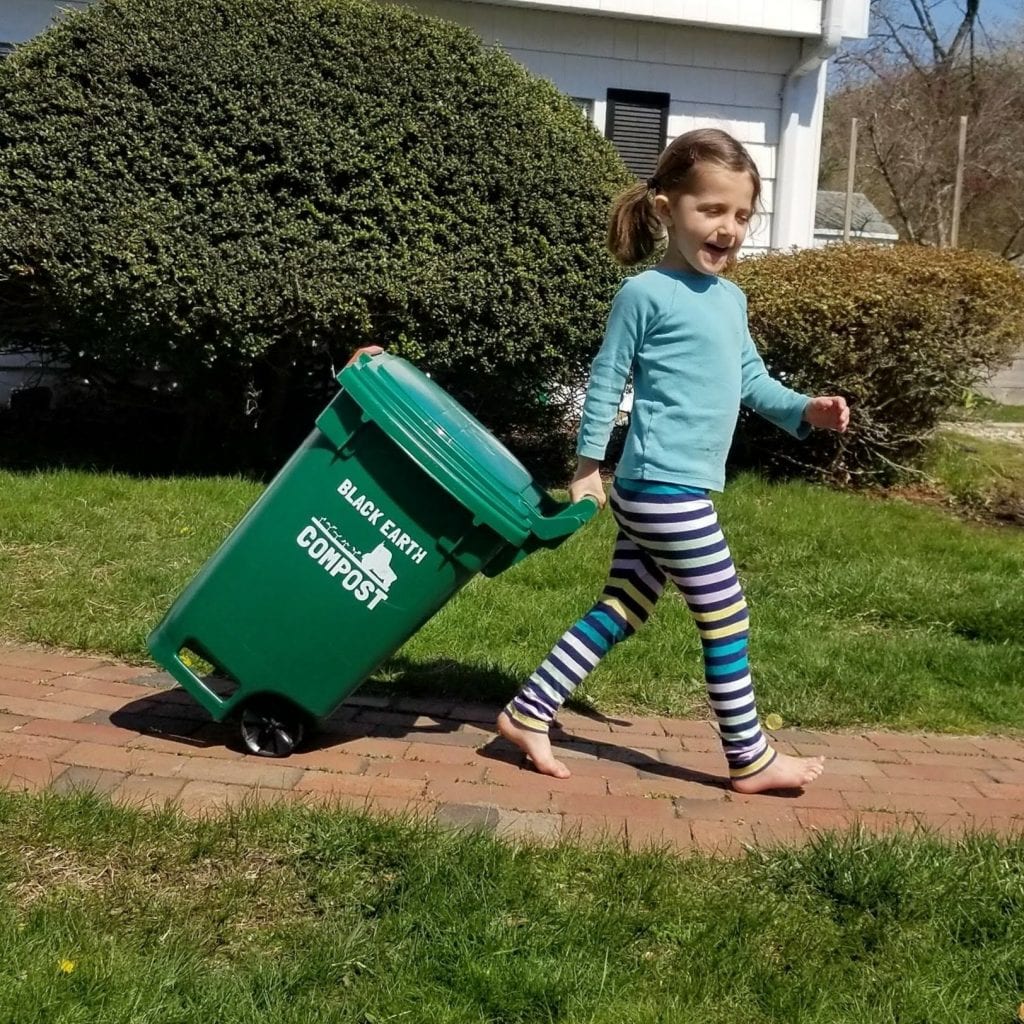
October 1, 2020 by Conor Miller, Founder of Black Earth Compost*
Compost, Grow, Eat, repeat...
This summer my four-year-old daughter came to understand what her Papa does for work. She now knows the difference between trash, recycling, and composting. She is taking the fruit sticker off the banana peel and tossing it into the green bin. She puts the green bin in her kid-sized electric car and drives it to the curb to set it out on the weekly collection day. In the spring, she helped hold the wooden boards of our raised bed kit made by Black Earth Compost, helped shovel the compost/soil mix into the bed, and planted the tomatoes, strawberries, cucumbers, squash, and more. Now she is in harvest mode, plucking cucumbers and tomatoes on an almost daily basis. Compost, Grow, Eat, repeat…
What she doesn’t know is that composting is at the nexus of three crises: all MA landfills will be closed by 2030, and we currently send our waste on trains to Ohio, Virginia and beyond, which will get extremely expensive. Compost is the heaviest element of the waste stream to divert. The US has a topsoil crisis on our farms that only compost can alleviate. And compost is an ideal means to pull CO2 out of the air by growing strong plants, and stores the carbon long term in the soil. These are three current crises that every household feels now, and will feel more the slower we address it.

Black Earth Compost was founded ten years ago to collect wasted food scraps from residents, schools and restaurants, convert it into a super nutrient rich compost (most compost is merely leaves and grass clippings), and help people to grow their own food. This 2020 pandemic has shown us that people really want to lean into this cycle: Compost, Grow, Eat, repeat. Some want to reduce their waste (compostable waste makes up 40% of household trash), others want to have raised beds and produce their own food, and both are more sustainable means of moving forward.
This year Black Earth began expanding into the South Shore because of the demand to have food scraps collected. Black Earth started a route in Weymouth and Hingham this summer and hopes to add Cohasset, and more towns in the near future.
In Hingham, one resident is determined to get the town moving in this more sustainable direction and gave Black Earth a grant of $5000 to subsidize 50% off ($50) the first six-months of service for Hingham residents! Depending on the size of the town, Black Earth Compost gives density discounts, so after a set amount of residents sign up, the price drops from $99 to $69 for six-months of service. After another threshold is reached, the price is dropped again to $49. This incentivizes residents to work together to grow large and efficient compost collection services. Black Earth has reached these lower tiers with dozens of towns across Eastern MA, including Newton, Brookline, Lexington, Belmont, Arlington, Natick. On the North Shore, everything from Swampscott up the coast to Newburyport is reduced pricing.
It’s not just residents that can compost. The largest producers of food waste are schools and commercial generators. In Hingham and Milton, the Fruit Center Marketplace has been composting with Black Earth Compost and sells the bags of Black Earth Compost, which is also sold at over 60 garden centers around the state.
Fruit Center marketplace owner Michael Mignosa said, “When Massachusetts implemented mandatory composting for all restaurants and food retailers several years ago, we at the Fruit Center Marketplace thought it could be a heavy burden until we started doing some research. Once we did, Black Earth was the best choice. Overall, they have been excellent. Composting is now a seamless part of our everyday routine. We separate out our organic waste, and Black Earth takes care of the rest. They are helpful and attentive to our questions and concerns and make the whole process of composting easy.”
And the growing process is just as easy too.
Useful Links:
Video: The Why, What and How to Compost
Sign up or pre-register for curbside service
Buy compost, soil, mulch, or raised beds

*Sponsored Content by Black Earth Composting


We’ve contracted with Black Earth for about nine months and it is so easy. Great service!!
Wonder if the town would ever contract with Black Earth to do compost pickups at the dump.